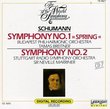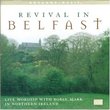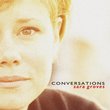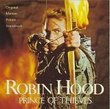| All Artists: Edward Elgar, Maggini Quartet, Peter Donohoe Title: Elgar: String Quartet in E minor; Piano Quintet in A minor Members Wishing: 0 Total Copies: 0 Label: Naxos Release Date: 8/5/1997 Genre: Classical Style: Chamber Music Number of Discs: 1 SwapaCD Credits: 1 UPC: 730099473729 |
Search - Edward Elgar, Maggini Quartet, Peter Donohoe :: Elgar: String Quartet in E minor; Piano Quintet in A minor
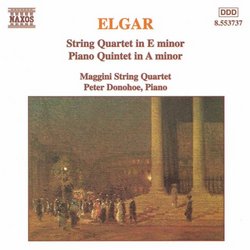 | Edward Elgar, Maggini Quartet, Peter Donohoe Elgar: String Quartet in E minor; Piano Quintet in A minor Genre: Classical
|
Larger Image |
CD DetailsSimilarly Requested CDs
|
CD ReviewsDo not buy this CD Muso | UK | 05/12/2006 (1 out of 5 stars) "I am amazed that so many people have found this recording so attractive. In my opinion, as a performing musician, who has played the Quintet, and who works regularly with world class string players, it is utterly appalling. True, there are some dramatic moments to be heard, but overall these performances do little justice to Elgar's scores, let alone the colours and sounds that could be brought forth with a little imagination - and a bit of elbow grease. Wrong notes, ignored dynamics, ignored phrasing and even incorrect tempi abound. I'm not talking about one or two things here and there, they are all over the place, by the dozen. The Quartet on this recording present such an ununified sound, I am amazed they actually regularly play together (perhaps they don't). The four instruments are completely unblended, and thus they all struggle to get to the foreground in louder passages. Donohoe's playing is again dramatic and intense, but any type of forte is simply brash. There is no variety of colour, no textural richness or swelling of the sound, all of which is so crucial in performances of romantic music, and especially when working with strings. As a practicing musican, my honest verdict of this cd is that each piece was rehearsed and recorded in a day. I cannot honestly believe that any group of adult musicians, who are this experienced, would play this way if they actually had rehearsed the piece, or had played it to someone who knew the work well. This cd presents the sort of sound and performance I would expect from a group of graduate students who were obliged to play together for chamber music credit - full of life but showing no refinement or attention to detail whatsoever. These distinguished and well known performers should be ashamed of themselves. If I had played that way, I would be." "The reminiscence of sinister trees" Stephen Taylor | Chapel Hill, North Carolina | 08/13/2001 (5 out of 5 stars) "Edward Elgar wrote to his future wife, Alice, on September 18, 1917: "Everything good and nice and clean and fresh and sweet is far away -- never to return." Depressed by World War I, feeling old age's tentacles creep up on him (he was 62), he also knew that the listeners of the age of clamor had already begun to regard his quintessentially Edwardian music as an anachronism. So, deeply upset, he poured his soul into the four great works of 1918, the last year of the war -- the cello concerto, violin sonata, string quartet, and piano quintet. All were written in a minor key and mirror Elgar's feelings of horror, madness, lamentation, unrest, uncertainty, nostalgia, and also the little joys that make every kind of darkness bearable. Woven around a "questioning motif", the E minor string quartet and A minor piano quintet recorded here were premiered in London's Wigmore Hall on May 21, 1919. They were Elgar's last significant compositions. Afterward, he called it a day and retired from music, dying lonely and cancer-ridden in 1934.The piano quintet is particularly interesting. The eery first movement is said to have been inspired by "the reminiscence of sinister trees", in Alice Elgar's words, referring to a cluster of lightning-mangled trees near Elgar's cottage in Sussex. Legend has it that they were the gnarled figures of a settlement of Spanish monks blasted by heaven as punishment for their "impious rites". Drawing on the myth, Elgar wove in a couple of haunting Spanish motifs, including a place where the first violin imitates a guitar by playing in pizzicato. The quintet's dark opening movement is followed by a soothing adagio, definitely inspired by sunnier memories and places, which gives way in turn to a thunderous andante-allegro in a major key (which I think is rather overbearing, coming right after the quiet second movement).What's interesting about this performance is that the Maggini Quartet uses 17th- and 18th-century instruments (hence the name -- Giovanni Paolo Maggini was a Brescian violin-maker of the early 1600s.) It has a neat effect, though you can't always tell the difference. Kudos, Naxos." A WINTER'S TALE DAVID BRYSON | Glossop Derbyshire England | 07/27/2003 (5 out of 5 stars) "Very well recorded this, and at the price an outstanding bargain.Considering their stature, these late and deeply characteristic pieces do not seem to be recorded very much. Both of them, particularly the quintet, seem to me even finer than the violin sonata that he wrote at around the same time, and I thought myself lucky to find so easily on one CD
performances worthy of my LP versions by the Claremont in the quartet and Ogdon and the Allegri in the quintet. To judge by broadcast versions that I have heard, the quintet seems to be a difficult work to bring off successfully -- the piano writing tends to sound square and awkward. Not so from Ogdon, not so from Donohoe. If pushed to a choice, my vote would probably still go to Ogdon and the Allegri for a slightly greater sense of impetus in the first movement, but nobody looking for a current version need hesitate about getting this one, especially if they want to hear a great soulful Elgarian climax in the slow movement -- a great moment on this record. In the quartet again the Maggini strike me as 'just right' and certainly as a thoroughly recommendable version for anyone just getting to know the piece. The Claremont version does not seem to be available now, and it is notable for a very adventurous account of the slow movement, taken at a very flowing tempo indeed. I have always reacted particularly positively to this performance which among other things recalls strongly the movement's obvious source of inspiration -- the marvellous andante of Brahms's A minor quartet. However the tempo the composer indicated is 'poco andante', and the Claremont give it at something more like 'molto andante', so while I still recommend collectors to keep a lookout in the hope that it will be reissued it may not be right for everyone.The booklet when talking about the quintet gives some picturesque Lovecraftian detail about ghostly trees haunted by impious monks and whatnot. While I am glad to know all this, it never crosses my mind as I listen to pure music of this order. What does cross my mind is how well the quintet's finale negotiates the familiar late-romantic minefield of 'cyclical form' -- sc. bringing back themes from an earlier movement. Brahms's third symphony has a lot a lot to answer for here when I think of some of the shuddersome finales that picked up on the device. This one is lovely, resigned and autumnal, not quite Elgar's last musical word but getting on that way, and rendered here with a touching understanding that has more to say to me than any ghostly legends." |

 Track Listings (6) - Disc #1
Track Listings (6) - Disc #1